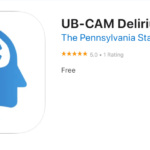Congratulations to Michael Devinney, MD, PhD, of Duke University School of Medicine on being awarded a FAER GEMSSTAR grant in 2021! The title of the grant is The Association of Blood-Brain Barrier Breakdown with Sleep Apnea and Postoperative Delirium. Download Dr. Devinney’s project abstract to learn more.
Author Archive: nidus_delirium
Delirium Research Hub Spotlight – Colm Cunningham, PhD
Every few months, the Delirium Research Hub selects an investigator and research study included in the Delirium Research Hub to feature as a Spotlight Investigator. This month, we are featuring Dr. Colm Cunningham for his study “Brain Vulnerability, Inflammation, and Energy Metabolism in Animal Models”. His research focuses on the role of systemic inflammation on […]
UB-CAM app is now available through Apple Store
Exciting news: UB-CAM App is now up and available in the Apple store (for the iPhone)! Download the UB-CAM Delirium Screen app from The Pennsylvania State University or directly from the App Store.
Congratulations NIDUS Year 5 Pilot Grant Awardees!
The NIDUS Pilots and Innovation Task Force announces two new pilot grants to advance innovation in delirium research. The goal is to provide funding for investigation into innovative areas of delirium research and support research on priority areas. From a pool of over 40 applications, these two grants have been selected for funding during Year 5. […]
USDeN Pilot Grants and Junior Investigator Intensive Program
The US Deprescribing Research Network has 2 open opportunities. Pilot and Grant Planning Awards – applications are now being accepted (deadline is January 22). Up to $60K per proposal for projects related to deprescribing research, For more information, see visit the USDeN. Junior Investigator Intensive – applications are now being accepted (deadline is February 1). This […]
Living in disadvantaged neighborhoods doubles post-op delirium risk for older adults
A new study by Dr. Franchesca Arias and Dr. Sharon Inouye showed older adults who live in the most disadvantaged neighborhoods are two times more likely to experience delirium after surgery than their counterparts from more affluent communities. Read the full press release here.
Mobility Action Group: Using Quality Improvement Methods to Create a Culture of Hospital Mobility
The Mobility Action Group (MACT) and Change Package were developed to provide a conceptual framework, road map, and step‐by‐step guide to enable mobility teams to implement mobility programs successfully and meet their mobilization goals. The MACT and Chage Package provides an innovative approach emphasizing system wide change that can help catalyze a culture of mobility […]
Congratulations NIDUS Year 4 Pilot Grant Awardees
The NIDUS Pilots and Innovation Task Force announces four new pilot grants to advance innovation in delirium research. The goal is to provide funding for investigation into innovative areas of delirium research and support research on priority areas. From a pool of over 40 applications, these four grants have been selected for funding during Year 4. […]
Delirium An Under Diagnosed Area Of Brain Aging And Degeneration, Podcast with Dr. Sharon Inouye
“Most shockingly, delirium is often unrecognized. Studies have shown that in affected persons, that delirium is only recognized by about 1/3 of physicians and nurses.” Listen or watch the conversation.
World Delirium Awareness Day 2020
Contributed by Maggie Webb, Research Associate at the Aging Brain Center, Marcus Institute for Aging Research, Hebrew SeniorLife Delirium is a serious, widespread, and morbid syndrome that is prevalent in many healthcare settings, including inpatient care for hospitalized older adults, post-anesthesia care units and post-surgical care, intensive care units, and the emergency department. Delirium can […]




